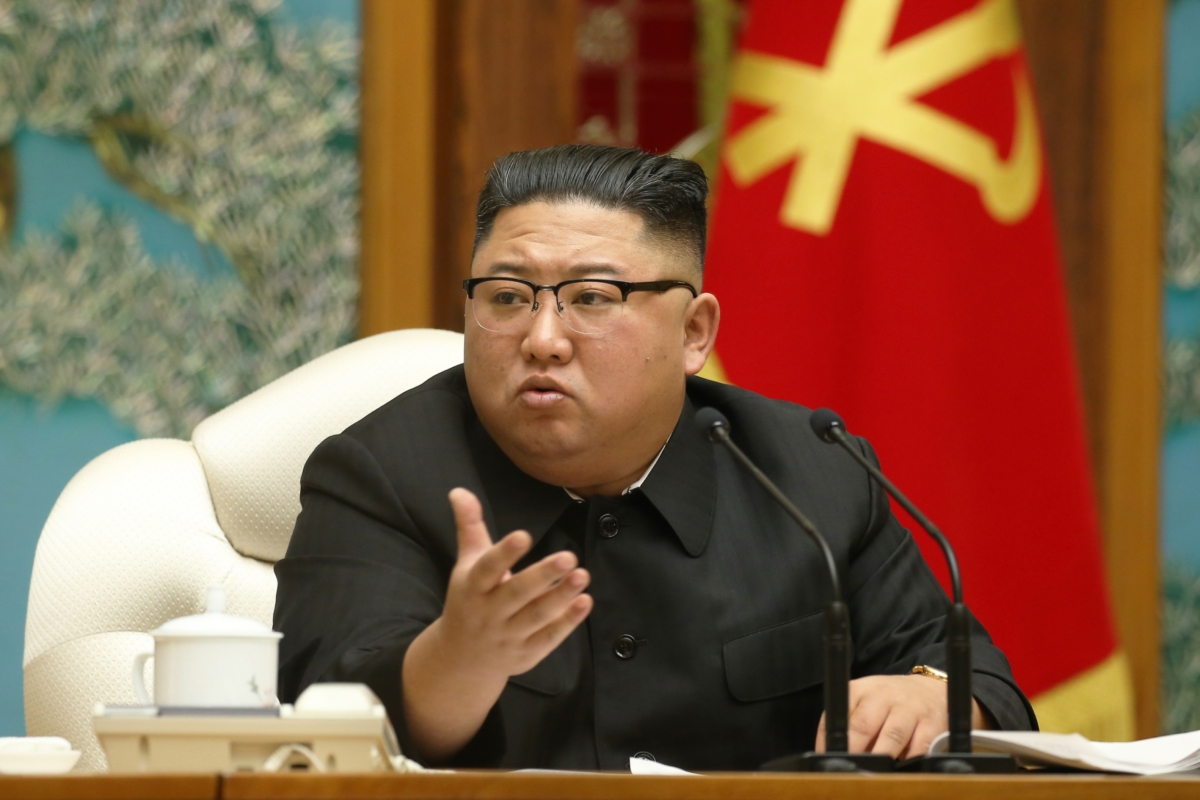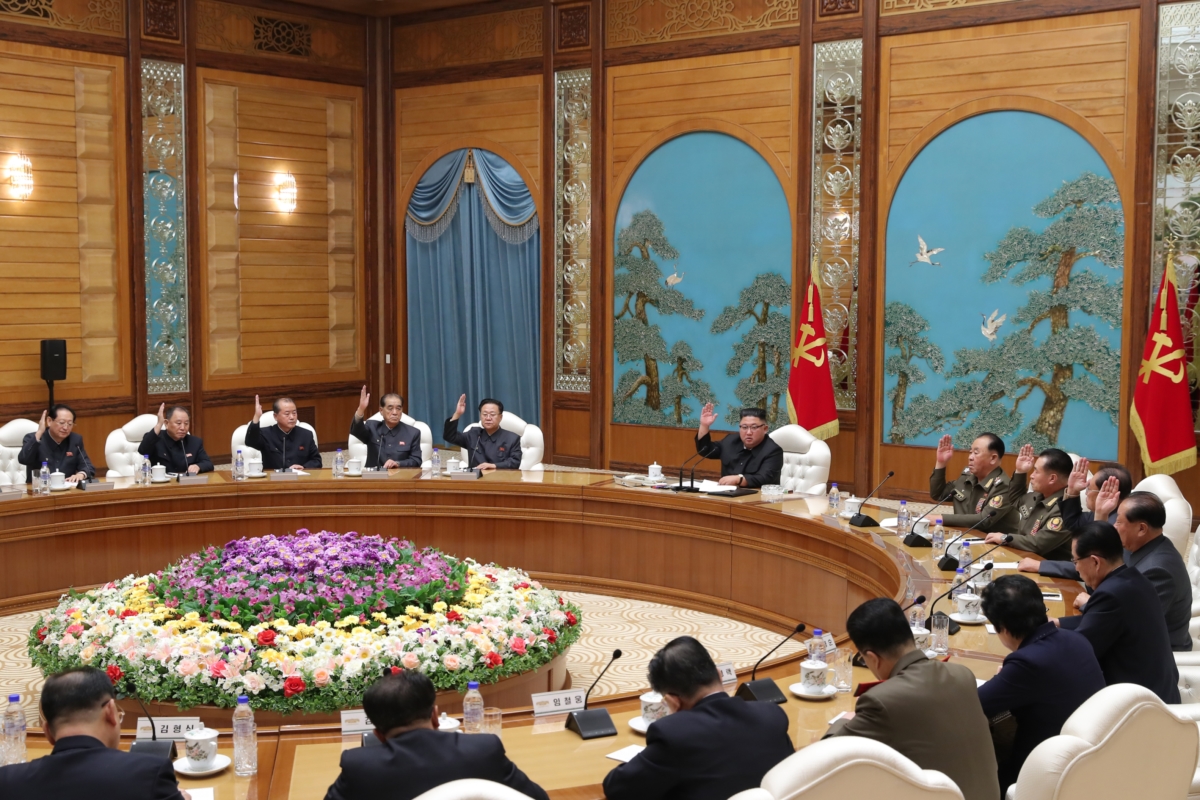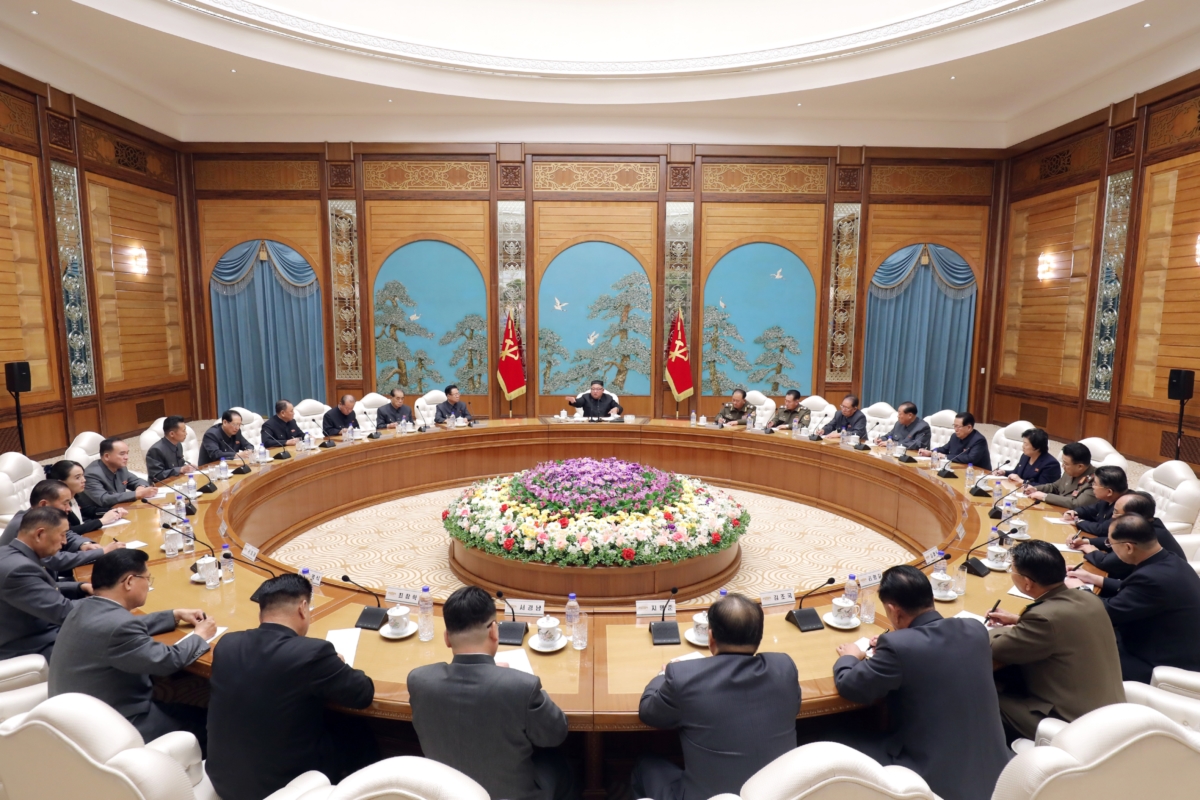KJU Attends 20th PB Meeting of the 7th Central Committee

Kim Jong Un (Kim Cho’ng-u’n) attended and presided over the 20th meeting of the Political Bureau, held on an expanded or enlarged basis, of the 7th Korean Workers’ Party [KWP] Central Committee at the Central Committee office building on 15 November (Monday). The meeting was attended by members, alternate (candidate) members and Presidium members of the Political Bureau along with Party Department Directors and Deputy Directors. Zooming into the meeting as observers were senior Central Committee cadres, chairs of the Party Provincial Committees, the DPRK’s top cop and chief public prosecutor and members of the emergency anti-epidemic.
Among those sitting around the table with KJU were: Choe Ryong Hae (Ch’oe Ryong-hae), Pak Pong Ju (Pak Pong-chu), Kim Yo Jong (Kim Yo’-cho’ng), Jo Yong Won (Cho Yo’ng-wo’n), Kim Yong Chol (Kim Yo’ng-ch’o’l), MAR Ri Pyong Chol (Ri Pyo’ng-ch’o’l), Ri Il Hwan (Ri Il-hwan), MAR Pak Jong Chon (Pak Cho’ng-chon), Col. Gen. Jong Kyong Thaek (Cho’ng Kyo’ng-t’aek), Pak Myong Son (Pak Myo’ng-son), Pak Thae Dok (Pak T’ae-dok), Kim Hyong Jun (Kim Hyong-chun), Thae Hyong Chol (T’ae Hyong-ch’o’l), Choe Pu Il (Ch’oe Pu-il) and Ri Yong Rae (Ri Yo’ng-rae).
The Political Bureau meeting “discussed in depth the issue of further tightening the state emergency anti-epidemic system in the face of the ever-worsening worldwide health crisis.” Kim Jong Un “analyzed and assessed the serious worldwide spread of COVID-19 and the state anti-epidemic situation” and he “clarified the tasks for the Party, military and economic fields to further tighten the emergency anti-epidemic front, the major front of the 80-day campaign and ways for doing so.” The Suryo’ng “stressed the need to keep a high alert, build a tight blocking wall and further intensify the anti-epidemic work, being aware of the important responsibility for the security of the state and well-being of the people.”

The meeting “reported and analyzed non-socialist practices in education organizations and in society as a whole” and it “seriously discussed the issues to decisively root them out.” The meeting also “sharply criticized” the “Party committee of Pyongyang University of Medicine which committed a serious crime, and the irresponsibility and extreme dereliction of duty of relevant departments of the Central Committee of the WPK, judicial and procuratorial organs and security organizations which shielded, connived and fostered the crime by failing to tighten the Party guidance over the university and by failing to strengthen the system of handling complaints, legal monitoring and control.”
The Political Bureau meeting “emphasized the need to awaken the Party organizations at all levels once again and wage a fiery Party-wide struggle to root out practices against the Party, the people and socialism and the need for the law enforcement organs, in particular, to upgrade the law enforcement so as to make sure that beautiful socialist traits are maintained in the overall sociopolitical, economic and moral life.” The Politbureau “made a deep study and discussion of agenda items referred to it and set forth important tasks and adopted relevant decisions with unanimous approval.”

Third Scandal’s the Charm?
It is not easy to count or measure these things, but the “serious crime” alleged to have occurred at Pyongyang University of Medicine is the third scandal that has been brought up for discussion and critique at a Political Bureau meeting. The prior scandals surfaced early in the year with the first being the mess at the cadres’ training institutions and the second being the inconsistent compliance with COVID-19 restrictions and measures. There have been a few other incidents or transactions that have occurred in and around the outer elite during 2020 that would also constitute “serious” and legitimate crimes, but the PY University of Medicine’s KWP Committee must have been a barn burner.
A “serious” crime could include the committee and university officials not complying with or implementing explicit directives or guidance from The Center, not fielding sufficient personnel or resource donations to the 80-day Battle or relegating the umpteenth icon or slogan monument to a shady backyard space on campus. There are a couple of clues involving the Pyongyang-based medical and medical academic communities.
First, prior to discussing the University of Medicine scandal, the Political Bureau addressed and analyzed “non-socialist practices in education organizations.” One would hope that the Pyongyang University of Medicine would be educating its students in medical practices and letting other practices, socialist or otherwise, assume a secondary and tertiary priority. If there was non-socialist or (clutch your pearls, cadres) anti-socialist practices at the university then it would be the provenance of the party committee to set the faculty on the right course. Members of the Party committee may already take a looser hand on such matters because, well, it’s a fucking medical school. But what if it was a “practice” itself? Speculatively, what if the Pyongyang University of Medicine decided to contravene Kim Jong Un’s recent instructions against importing, the “import disease”? It’s not impossible. Finally, what if the university and its “serious crime” involves the delays in construction and opening of the Pyongyang General Hospital?
The scandal at Pyongyang University of Medicine appears to have involved a cover-up by the Ministry of Public Security, the DPRK Central Prosecutor’s Office and the Central Committee Departments that supervise the work of Pyongyang University of Medicine and its Party committee. Those departments would be the Organization Guidance Department [OGD] which supervises the works of Party committees, the Workers and Social Organizations Department which has custody of the Youth League which is intended to backstop the influence of the Party committee apparatus and North Korea’s professional associations and the Science Education Department [SED].
A new head of SED, Choe Sang Gon (Ch’oe Sang-gon), was appointed during early October. Choe’s appointment followed the removal from office of Pak Thae Song (Pak T’ae-so’ng), the KWP Vice Chairman for Science and Education during September. We might also look around the big circular table where the Political Bureau met on 15 November and see three other relevant senior officials missing in action. The first is DPRK Premier Kim Tok Hun (Kim Tok-hun), under whose jurisdiction the Ministry of Public Health and Ministry of Higher Education fall in his capacity as head of the Cabinet. The second is KWP Vice Chairman for Workers’ and Social Organizations Choe Hwi (Ch’oe Hwi). Choe is a core leadership figure in the KJU regime and has been participating in storm recovery work. In any event, he is all but assured to re-emerge perhaps in similar fashion as Pak Thae Song. The second is Kim Jae Ryong (Kim Ch’ae-ryong), who was holding the OGD slot on the Executive Policy Council (Bureau) even if some sources report he doesn’t head OGD itself, but a new department called the Organization Administrative Department. The University of Medicine KWP Committee fits under OGD, but the prosecutors’ office is said to report to the Organization Administrative Department.
Kim Jong Un has expanded the dynamic of individual responsibility among senior officials whereby they can accept responsibility for deficiencies in policies or processes but keep their career. That is what happened with Pak Thae Song and probably applies to Kim Jae Ryong. But Kim Jae Ryong has already been moved once because he couldn’t crack the COVID-19 whip back at the beginning of 2020 so this cat has lost at least one of his nine lives.
View Original Article